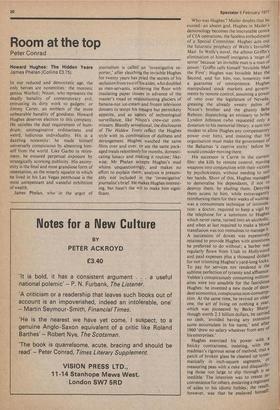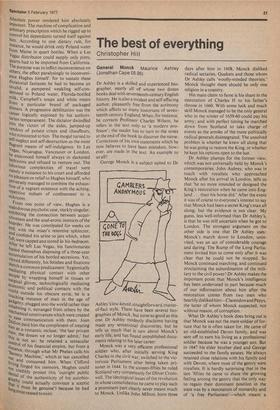Room at the top
Peter Conrad
Howard Hughes: The Hidden Years James Phelan (Collins 0.75) In our reduced and democratic age, the only heroes are nonentities: the moronic genius Warhol; Nixon, who represents the deadly banality of contemporary evil, entrusting its dirty work to gadgets; or Jimmy Carter, an emblem of the more unbearable banality of goodness. Howard Hughes deserves election to this company. He satisfies the dual requirement of humdrum, unimaginative ordinariness and weird, ludicrous individuality. His is a dazzling nonentity: he made himself universally conspicuous by absenting himself from the world. Like Garbo in retirement, he ensured perpetual exposure by strategically scorning publicity. His anonymity is the final and most grandiose form of ostentation, as the miserly squalor in which he lived in his Las Vegas penthouse is the most unrepentant and wasteful exhibition of wealth.
James Phelan, who in the argot of journalism is called an 'investigative reporter,' after sleuthing the invisible Hughes for twenty years has pried the secrets of his seclusion from two of h is aides. who doubled as men-servants, scattering the floor with insulating paper tissues in advance of the master's tread or requisitioning glaciers of banana-nut ice-cream and frozen television dinners to tempt his meagre but pernickety appetite, and as agents of technological surveillance, like Nixon's crew-cut commissars. Blandly sensational, the disclosures of The Hidden Years reflect the Hughes style with its combination of dullness and derangement. Hughes watched the same films over and over, or ate the same packaged meals relentlessly for months, domesticating lunacy and making it routine; likewise, Mr Phelan accepts Hughes's mad whims unquestioningly, and makes no effort to explain them: analysis is presumably not included in the 'investigative' journalist's brief. He makes Hughes interesting, but hasn't the wit to make him significant. Who was Hughes? Mailer doubts that he existed: an absent god. Hughes in Mailer's demonology becomes the inscrutable centre of CIA operations, the faceless embodiment of a Special Committee. Hughes acts out the futuristic prophecy of Wells's Invisible Man In Wells's novel, the albino Griffin's elimination of himself instigates a 'reign of terror' because 'an invisible man is a man of power.' Griffin calls himself 'Invisible Man the First"; Hughes was Invisible Man the Second, and for him, too, nonentity was a guarantee of omnipotence. Hughes manipulated stock markets and governments by remote control, assuming a power of veto over the legislature of Nevada, greasing the already sweaty palms of Nixon's brother and the ghastly Bebe Rebozo, dispatching an emissary to bribe Lyndon Johnson (who requested only ' a donation to his memorial library, a sum too modest to allow Hughes any compensatory power over him), and insisting that his organisation must make the government of the Bahamas 'a captive entity' before he would consider moving there.
His successor is Carrie in the current film: she kills by remote control, moving weapons into conjunction with their victims by psychokinesis, without needing to soil her hands. Short of this, Hughes managed to demoralise his dependants, if not to destroy them, by eluding them. Denying them access to him, while extravagantlY reimbursing them for their weeks of waiting, was a consummate technique of intimidation: a doctor, required to keep a vigil bY the telephone for a summons to Hughes which never came, turned into an alcoholic. and when at last required to make a blood transfusion was too tremulous to manage it. A succession of doxies was expensively retained to provide Hughes with attentions he preferred to do without; a barber was regularly flown from Utah to Hollywood and paid expenses plus a thousand dollars for not trimming Hughes's yard-long To pay for services not rendered is the sublime perfection of tyranny and affluence. Veblen's conspicuously consuming millionaires were too unsubtle for the fastidious Hughes: he invented a new mode of decadent economics, conspicuous non-comnsiullmPni tion. At the same time, he revived an older one, the art of living on nothing a year, which was pioneered by Becky SharP: though worth 2.3 billion dollars, he carried no cash, 'avoided having any extensive sums accumulate in his name,' and after 1960 'drew no salary whatever from any of his enterprises.'
Hughes exercised his power with a finicky contrariness, insisting, with the madman's rigorous sense of method, that a patch of broken glass be cleaned up systematically in inch-square segments, or measuring peas with a rake and disqualifYing those too large to slip through it as inedible. The intention was to create in convenience for others, enslaving a regiment of aides to his idiotic foibles; the result, however, was that he enslaved himself Absolute power rendered him absolutely Impotent. The machine of complication and arbitrary prescription which he rigged up to control his dependants turned itself against him. According to one dietary rule, for instance, he would drink only Poland water from Maine in quart bottles. When a Las Vegas distributor could supply only pints, quarts had to be imported from California. The purpose was to inflict inconvenience on Others, the effect paralysingly to inconvenience Hughes himself: for to sustain these dictatorial fantasies he had to become an I,nvalid, a pampered weakling self-condemned to Poland water, Florida-bottled Milk, Campbell's soups and white meats from a particular brand of packaged dinners. A progressive debilitation was the career logically enjoined by his authoritarian temperament. The dictator dwindled into the victim of the aides, jumped-up vendors of potato crisps and chauffeurs, who ministered to him The mogul turned to self-neglect and self-destruction as the most flagrant means of self-indulgence. In Las ,Vegas, Nicaragua, Vancouver or London, ne ensconced himself always in darkened bedrooms and refused to venture out. The laborious complexities of travel were Merely a nuisance to his court and afforded no Pleasure or relief to Hughes himself, who Perversely managed to combine the exhaustion of a vagrant existence with the aching, repetitive tedium of confinement to a sickroom, From one point of view, Hughes is a Malodorous psychotic case, starkly singular, e.xhibiting the connection between acquisitiveness and the anal-erotic instincts of the hoarder. He was constipated for weeks on end. with the miser's retentive sphincter, !nd confided his urine to jars which, when lull, were capped and stored in his bedroom. "rkfter he left Las Vegas, his functionaries Dusted themselves disposing of a three-year ae, cumulation of his bottled secretions. Yet, viewed differently, his fetishes and fixations sketch a. common predicament : 'hygienically Mediating physical contact with other De°Ple by wrapping himself in tissues or surgical gloves, technologically mediating ewconomic and political contacts with the
Outside his obscure eyrie, he is a
°rid ouchinginstance of man in the age of rdgetry, plugged into the world rather than nhabiting it, estranged from others by the Mechanical contrivances which were created ease communication with them. Joan h.itnidion paid him the compliment of treating rn as a romantic recluse, 'the last private tha. n., the dream we no longer admit,' but Is Is not so: he retained a tentacular • -_,Ontroi of his financial empire, but from a ,dsistance. through what Mr Phelan calls his ecrecy Machine,' which at last cancelled 'fut. and consumed him. When Clifford Ing forged his memoirs. Hughes could 7,01. credibly protest (his 'outright public of the authenticity of his autobio6thaPh.Y could actually convince a sceptic kat I! must be genuine') because he had 'lig since ceased to exist.



































 Previous page
Previous page